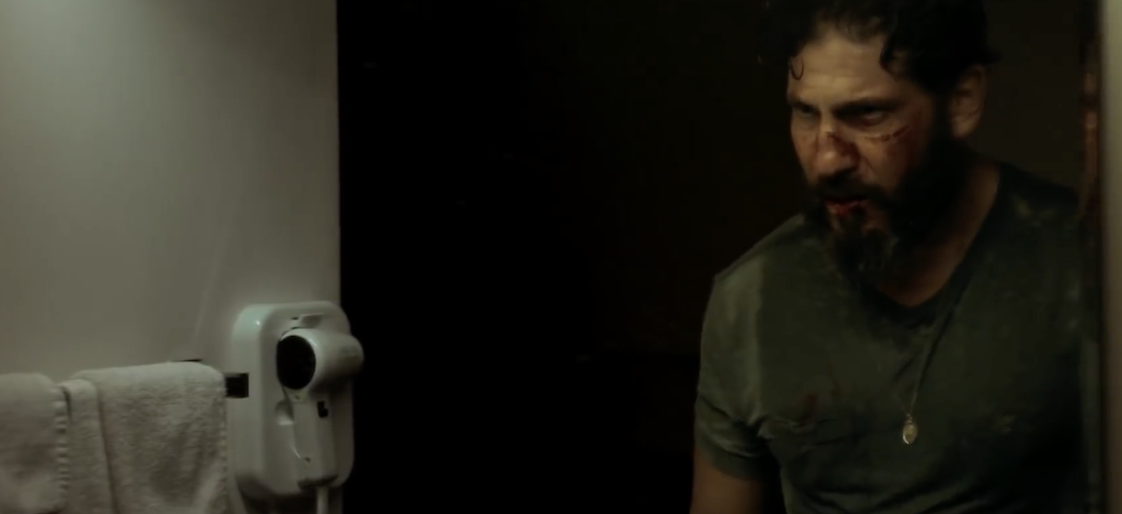It’s past midnight in a quiet Alaskan town as three friends meet in a bar for a friendly game of after-hours poker. Conversation shifts from politics to business, their rhetoric growing bolder with each drink. Despite the boyish pleasantries, there has been an intangible air of disquiet from the onset, but then enters its embodiment, Elwood (Christopher Abbott). When one of the men has a verbal altercation with the unnervingly idiosyncratic stranger, Elwood leaves. Only, he soon returns with a gun, callously murdering each of the three friends before the film’s bitterly cruel title Sweet Virgina flashes upon the screen.
Quite the opening, wouldn’t you say? Well, that’s exactly what I thought as my hands rubbed together with eager anticipation of the twisted thrills that were to surely come. Too bad, then, that I had to wait almost an hour before I found myself even as remotely engaged as I was by this meticulously atmospheric opening scene.
To be clear, Sweet Virgina makes a strong case for Jamie M. Dagg as a talented director with a great deal of potential (despite some questionable indulgences I will discuss further in a moment), but is ultimately let down by inconsistent script written by brothers Benjamin and Paul China.
The inherent problem with the page-to-screen transition here is that Dagg conceives Sweet Virginia as a slow-burning neo-noir thriller, and while the dialogue is not inherently bad by any means, it critically lacks the intrigue and colour required to elevate Dagg’s deliberate pacing.
However, Sweet Virginia’s problematic pacing falls squarely on Dagg’s shoulders in the occasional moment he tries to conjure tension where there is none to be found, only cliché.
Furthermore, while Dagg does a great job, for the most part, in directing his actors, there are those who are grossly underwritten by the China brothers, none more so than Imogen Poots’ Lila and Rosemarie DeWitt’s Bernadette.
Both women are widows of the men murdered, and without giving too much away, it is revealed early that Lila is implicitly responsible for the killings, as it turns out she hired Elwood to murder her own husband, though not the two other men. Poots does a wonderful job conveying Lila’s conflicted emotions, which is all the more impressive considering the screenplay offers her character little meaningful depth, saying that she had her husband killed for no reason other than that he was “a fucking pig.” Her presence feels less like an active, three-dimensional characterisation, and more of an arbitrary facilitator for the story.
Bernadette, then, was in a loveless marriage with her deceased husband, and has lingering remorse for her ongoing affair with the film’s main character Sam (Jon Bernthal). Sadly, this is yet another character the writers failed to flesh out, as her remorse is touched upon, but it feels like more of an obligatory narrative burden to them than an actual crucial component to the film’s emotional centre deserving of closure.
Thank God then for Jon Bernthal! The actor has proven his ability time and again, and here it is no different, but his is the one character that boasts the depth to go along with the performance.
Bernthal’s Sam is a beat-up retired bull rider who runs a motel owned by his late brother, which also happens to be housing Elwood. The role offers Bernthal the opportunity to embody a character with a level of vulnerability unseen in his usual uber-masculine shtick, adding a refreshingly well-rounded nuance that Sweet Virginia otherwise sorely lacks, whilst proving the versatility that he possesses as an actor.
Abbott’s Elwood is something of the opposite though. He is positively electric in the opening scene, giving the sense that he would be the character that practically leaps off the screen, but sadly that is never fully realised. I get the sense that the creatives involved envisioned Elwood as this decade’s answer to Anton Chigurh, and although he is an undeniably intriguing meditation on psychosis, the character never comes off as anything more than a stiff case study. This is partly due to Abbott’s erratic performance, which can come off interchangeably as flat or engrossing, but never anything in between.
While the concluding act further adds to the short list of saving graces, Jamie M. Dagg’s 2017 feature Sweet Virginia is ultimately a hodgepodge of accomplished direction, misguided pacing, and half-baked character work elevated by mostly solid acting.
5/10
![]()
![]()
![]()
![]()
![]()
![]()
![]()
![]()
![]()
![]()

